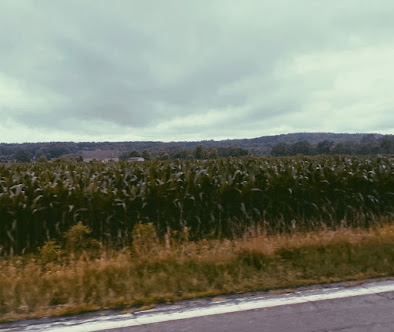The Indisputable Perspectivism of Bigfoot
The first thing that came to mind while reading Linda Brewer's "20/20" was famed existentialist Friedrich Nietzsche.
Let me explain.
"20/20" is a short story about two people on a road trip. Throughout, the male character grows increasingly frustrated as his female counterpart makes wild claims about the things she observes as she drives. To quickly summarize, the story all comes down to perspective: when Ruthie insists she saw Bigfoot, Bill simply sees "reflectors nailed to a tree stump."
This conflict falls wonderfully into the laps of existentialists. Søren Kierkegaard, for example, would approach the dilemma with his ideology of subjectivity: every truth that exists in this world is formed by the subjective experiences and individual attitudes of those who view it. His theory is dependent on the existence of truth.
Friedrich Nietzsche, on the other hand, would strongly disagree with his antithetical predecessor. Nietzsche argues that due to perspectivism - and the correspondence theory of truth - there can be no truth. He affirms, "No, facts is precisely what there is not, only interpretations. We cannot establish any fact 'in itself': perhaps it is folly to want to do such a thing." He insists that it is impossible to conceptualize reality with a mere word or statement of "fact" because no aspect of reality will ever be universal. Any designation of truth exists solely for convenience.
I think this somewhat applies to Ruthie and Bill in "20/20." Disregarding the fact that Bigfoot is a fictitious cryptid and a tree stump is a much more believable sight, it makes sense to accept that these descriptions can both be true to their respective hosts. Based on her experiences of what a sasquatch looks like, Ruthie can wholeheartedly believe that she saw Bigfoot, using this interpretation to make sense of what her eyes see. Bill, alternatively, interprets the scene in mundanity to do the exact same thing. Taking into account the ideologies of both philosophers aforementioned, they are simultaneously correct and incorrect in their assertions.
I hope this doesn't read like an existentialism essay, though I am certainly well-versed in writing them. I guess - sometimes - my brain can't escape the spirals of "nothing is real" and "life is meaningless." At least this story has some meaning, thanks to these harbingers of existential dread.
 |
| What do you see? Corn? or a Chupacabra? |
*Disclaimer: I do not support or endorse Nietzsche's world view or the appropriation of his ideologies to promote hatred. He is a dangerous philosopher with problematic stances (not covered in this silly little blog post) and I just thought I should make it known that his work should be approached very cautiously, should anyone be inspired to explore these themes further. Carry on :)


Comments
Post a Comment